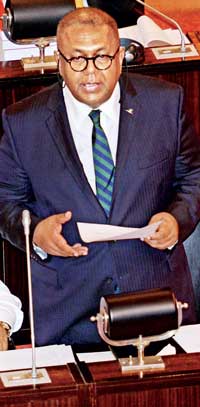Reply To:
Name - Reply Comment
Last Updated : 2024-04-26 13:26:00
 By Chandeepa Wettasinghe
By Chandeepa Wettasinghe
Finance and Mass Media Minister Mangala Samaraweera’s self-titled ‘Designer Budget’ fitted slimly around the government’s Vision 2025 plan to harness the potential of a maritime trading economy through talent development, empowerment, entrepreneurship and widespread market liberalization, tempered only by increased environmental protection.
“Our battle to restore macroeconomic stability on a more sustainable footing needs continuous effort. In line with Vision 2025, we need to undertake bold reforms in factor markets in order to eliminate price distortions and restore property rights in accordance with market principles aiming at promoting faster and sustainable growth,” he said.
Samaraweera’s disciplined and visionary speech centred around the ‘Blue-Green’ economy, referring to ocean and environmental protection respectively, but the reference to the lead parties in the unity government; blue for the Sri Lanka Freedom Party, and green for the United National Party was not lost, since the government has been calling for the Vision 2025 to be collectively accepted, beyond the past traditions of sabotaging party politics.
The budget deficit is expected to fall to 4.8 percent of Gross Domestic Product (GDP) in 2018, compared to a revised projection of 5.2 percent of GDP this year, continuing down the path of fiscal consolidation, with the budget implementation to be tracked by a newly established unit at the Finance & Mass Media Ministry.
The government is hoping to raise Rs. 2.32 trillion in revenue or 16.3 percent of Gross Domestic Product (GDP) for 2018, increasing from Rs. 1.99 trillion, or 15.4 percent of GDP figures projected in 2017.
The bulk of the Rs. 110 billion in new revenue proposals for 2018 came through three avenues.
One centred on increasing taxes on luxury vehicles and those running on fossil fuels, in order to encourage electric vehicle usage and to have only electric vehicles running in the country by 2040.
A new Debt Repayment Levy of Rs. 2 for every Rs. 1,000 transacted through banks will have to be borne by the banks for the next three years, in order to support the government’s ability to repay bunching up debt starting in 2019.
‘‘Our complex labour laws and bureaucracy have unwittingly obstructed foreign enterprises from entering into the country, thereby, preventing the much needed competition for the local industries. Trade reforms are integral to national competitiveness. Let me say this, competition breeds success. It tests our limits andforces innovation
The third was the removal of exemptions of Value Added Tax on several imports and the imposition of a Nation Building Tax on liquor.
Despite the recent introduction of a new Inland Revenue Act and the expectation of direct tax collection increasing by 21.8 percent in 2018, the ratio of direct taxes to indirect taxes in the government’s tax income recorded only a small growth in the right direction, with income taxes expected to bring in 18.4 percent of total tax income in 2018 compared to 17.6 percent this year.
A lower direct to indirect tax ratio indicates a more inequitable tax system.
Expenditure meanwhile, is expected to increase to Rs. 3 trillion, or 21.1 percent of GDP in 2018 from Rs. 2.68 trillion, or 20.6 percent of GDP in 2017.
“A Government whose vision is to develop the country, should be not to give away a piece of fish and make people ‘economically handicapped and entirely government dependent’, but to give them a fishing rod and create a means of living in order to meet their expectations,” Samaraweera said.
In keeping with this vision, the budget brought in key proposals to improve education and vocational training, investments in research and development, proposals further liberalizing the labour market, and a host of interest subsidies and financial incentives for the youth, women and small and medium-scale enterprises to become more entrepreneurial and orient themselves towards international trade.
Many investments were also envisioned to be partnerships with the private sector, given the government’s lack of fiscal space.
In addition to opening up key sectors such as land and shipping to foreign investment, Samaraweera also proposed to remove 1,200 para-tariffs—compared to 100 proposed in 2017—as a part of further opening up the fairly closed Sri Lankan economy.
“Our complex labour laws and bureaucracy have unwittingly obstructed foreign enterprises from entering into the country, thereby, preventing the much needed competition for the local industries. Trade reforms are integral to national competitiveness. Let me say this, competition breeds success. It tests our limits and forces innovation,” he said.
Proposals were also made to introduce anti-trust laws to foster competition and address monopolies.
The minister proposed to improve the availability of information to businesses and facilitate smoother administrative processes through further digitalization of government services.
In short, the 2018 budget could be described as the biggest step the two-year old government has taken towards a knowledge-based, export-oriented social market economy it has touted since coming to power while continuing the fiscal consolidation process prescribed by the International Monetary Fund, although, implementation has ever been the weak point of every successive Sri Lankan government.

Add comment
Comments will be edited (grammar, spelling and slang) and authorized at the discretion of Daily Mirror online. The website also has the right not to publish selected comments.
Reply To:
Name - Reply Comment
US authorities are currently reviewing the manifest of every cargo aboard MV
On March 26, a couple arriving from Thailand was arrested with 88 live animal
According to villagers from Naula-Moragolla out of 105 families 80 can afford
Is the situation in Sri Lanka so grim that locals harbour hope that they coul